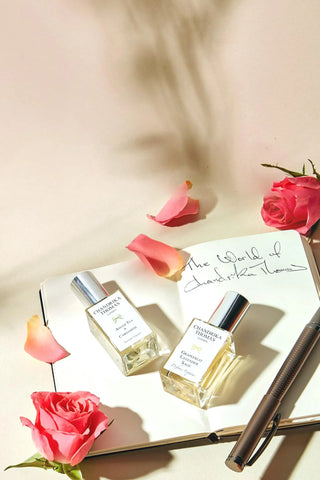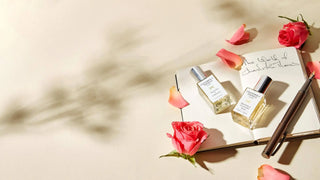A spritz of perfume can take us back to special moments, stir feelings, and even reflect our identity. Fragrances, in their various forms, play a big role in our lives, influencing how we're perceived. This note will break down the differences between perfume, Eau de Parfum, Eau de Toilette, and Eau de Cologne, aiming to help you understand the importance of choosing the right scent for the right moment.
As we explore the world of fragrances, let's uncover the unique characteristics of each scent category – from the luxurious opulence of perfume to the refined simplicity of Eau de Parfum, the refreshing appeal of Eau de Toilette, and the invigorating energy of Cologne. Perfume, often considered the pinnacle of fragrance, captures attention with its rich concentration of aromatic compounds, making it a go-to choice for special occasions. Eau de Parfum is known to provide a slightly lighter option that perfectly balances enduring sophistication with everyday subtlety. Meanwhile, Cologne, with its light fragrance concentration, bursts forth with energising vivacity, offering a quick, invigorating burst of scent. Join us as we unravel the essence of each category in the captivating realm of fragrances.

Perfume
Perfume is a captivating blend of art and science, characterised by concentrations ranging from 15% to 40%, unfolding as a rich and complex olfactory masterpiece. The perfume creation is a meticulous process, reminiscent of an artist's craft, where perfumers carefully blend elements to fashion a unique and harmonious fragrance. Crafted from high-quality extracts and essential oils sourced from flowers, fruits, spices, and woods, and structured with top, middle, and base notes, the perfume presents a layered composition that enhances its complexity and depth, resulting in a diverse range of fragrances.
Rooted in a history spanning centuries, perfume holds cultural significance and embodies a sense of timeless luxury. Some perfumes, featuring exclusive and rare ingredients, attain the status of coveted treasures for fragrance enthusiasts.
The enduring longevity and pronounced sillage of the perfume distinguish it as a lasting and alluring presence on the skin. This is attributed to the higher concentration of perfume, resulting in scents that linger like whispered secrets, making it an ideal choice for special occasions. Despite its higher price point, the limited application required for this enduring fragrance ensures a cost-effective investment.

Eau De Parfum (EDP)
Eau de Parfum (EDP) is the refined counterpart to perfume, striking a harmonious balance between enduring sophistication and everyday subtlety. In comparison to perfume, Eau de Parfum contains a slightly lower concentration of aromatic compounds, typically ranging from 15% to 20%, making it a lighter but still long-lasting fragrance option.
Characterised by a well-crafted blend of top, middle, and base notes, Eau de Parfum unfolds like perfume, albeit with a gentler touch. The top notes make a fresh and initial impression, followed by the middle notes that define the fragrance's character, and finally settle into the base notes for a lingering finish. This layered composition contributes to the complexity and depth of Eau de Parfum, allowing it to evolve gracefully on the skin throughout the day. Eau de Parfum proves to be adaptable and fitting for diverse situations. Its enduring nature makes it a reliable choice for day-to-day wear, offering a subtle yet distinctive fragrance that lasts for several hours. Whether it's a professional setting, a casual outing, or an evening event, Eau de Parfum complements a diverse range of situations. It strikes the perfect balance for those who desire a fragrance that is both refined and adaptable to different moments in their lives.
In essence, Eau de Parfum encapsulates the artistry of perfumery in a more accessible and versatile form. Its nuanced concentration and sophisticated character make it a staple for individuals seeking a fragrance that seamlessly transitions from the boardroom to a night out, embodying an enduring allure that stands out without being overwhelming.

Eau De Toilette (EDT)
Eau de Toilette is a delightful category within the world of fragrances, known for its refreshing and invigorating nature. In terms of concentration, EDT contains a lower percentage of aromatic compounds compared to its counterpart, Eau de Parfum, typically ranging from 5% to 15%. This lower concentration results in a lighter scent that is perfect for those who prefer a subtle and more casual fragrance experience.
Several iconic fragrances fall under the Eau de Toilette category. The differences in formulation between Eau de Toilette and Eau de Parfum is beyond concentration. Eau de Toilette often highlights the introduction of top notes, crafting an immediate and revitalising impact. While both share similarities in their layered compositions, Eau de Toilette's lighter concentration contributes to its distinctively brisk character, making it a popular choice for individuals seeking a fragrance that is both refreshing and versatile.
The defining characteristic of Eau de Toilette is its brisk and immediate freshness. It often features vibrant top notes that provide a quick burst of scent upon application, making it ideal for daytime wear and warmer seasons. This lighter formulation ensures that the fragrance is not overwhelming, making Eau de Toilette a perfect choice for casual occasions, outdoor activities, or professional settings where a more discreet aroma is preferred. Its versatility allows for everyday use, creating a pleasant and uplifting olfactory experience without being too intense.
Cologne (Eau De Cologne)
Cologne is a distinct category in the fragrance world. In terms of concentration, cologne generally has a lower percentage of aromatic compounds, typically ranging from 2% to 5%. This results in a lighter fragrance compared to Eau de Toilette, offering a subtle and refreshing scent that is perfect for various occasions.
Alternatively referred to as Eau de Cologne, is distinguished by its refreshing and invigorating characteristics. Originating from the German city of Cologne in the 18th century, this type of fragrance was initially created by an Italian perfumer named Johann Maria Farina. The term "cologne" has since become synonymous with a light, citrus-based fragrance. Over the years, cologne has evolved, and while it traditionally featured citrus notes, modern formulations may include a broader range of aromatic elements.
It is ideally suited for situations that call for a subtle and refreshing scent. Its light concentration makes it an excellent choice for everyday wear, particularly in casual or outdoor settings. Perfect for daytime gatherings, weekend outings, or casual workplace environments, cologne provides a pleasant and unobtrusive fragrance that enhances personal grooming without overpowering the senses. Additionally, its historical association with cleanliness and freshness makes cologne an ideal choice for post-shower application, adding a touch of revitalising aroma to one's routine.

Factors to Consider
Selecting the perfect fragrance involves considering several key factors to ensure it aligns with your taste, the occasion, and the season, especially when choosing between perfume, Eau de parfum, eau de toilette, and cologne.
Personal Preference: Identify the fragrance category that aligns with your taste, be it perfume, eau de parfum, eau de toilette, or cologne. Perfume offers the highest concentration and longevity, while cologne provides a lighter, more casual option. Understanding your preferred intensity guides you toward the right category.
Occasion: Adjust your fragrance selection based on the occasion. Opt for the long-lasting allure of perfume for formal events, while Eau de Parfum strikes a balance for various situations. Eau de toilette is well-suited for everyday use, while cologne provides a refreshing option for more casual or outdoor environments.
Seasonal Considerations: Factor in the season when choosing between fragrance types. Lighter options like eau de toilette and cologne are excellent for warmer months, while the richer concentration of perfume and Eau de Parfum may be preferred during colder

Tips for Choosing the Right Fragrance Type
Skin Test: Experiment with each fragrance type by applying a sample on your skin to observe how they interact with your individual body chemistry. Perfume and Eau de Parfum may develop more uniquely on your skin compared to the lighter options.
Avoid Being Overwhelmed: When testing different fragrance types, avoid overwhelming your senses. Smell coffee beans between testing to neutralise your olfactory senses and ensure each type is distinct in your evaluation.
Take note of the Intensity: Familiarise yourself with the variations in concentration among different types of fragrances. The intensity of each type directly impacts the longevity and projection of the fragrance, helping you choose the one that best fits your preferences.
Evaluate Dry Down: Pay attention to how each fragrance type evolves on your skin over time. The dry down, or the final scent after application, varies among perfume categories and is essential in choosing a fragrance that aligns with your desired scent

Selecting the appropriate fragrance type is a personal exploration that involves discovering your own preferences. It is important to understand the distinctions between perfume, eau de parfum, eau de toilette, and cologne to make informed choices that align with your personal taste.
There are plenty of choices for you. Explore and enjoy the journey of finding your signature fragrance that resonates with your essence and enhances the beauty of every experience. As you dive into this fragrant journey, feel free to read my notes to uncover more about the captivating world of perfumery. Each scent tells a story, and now, it's time for you to create yours. Happy exploring!



